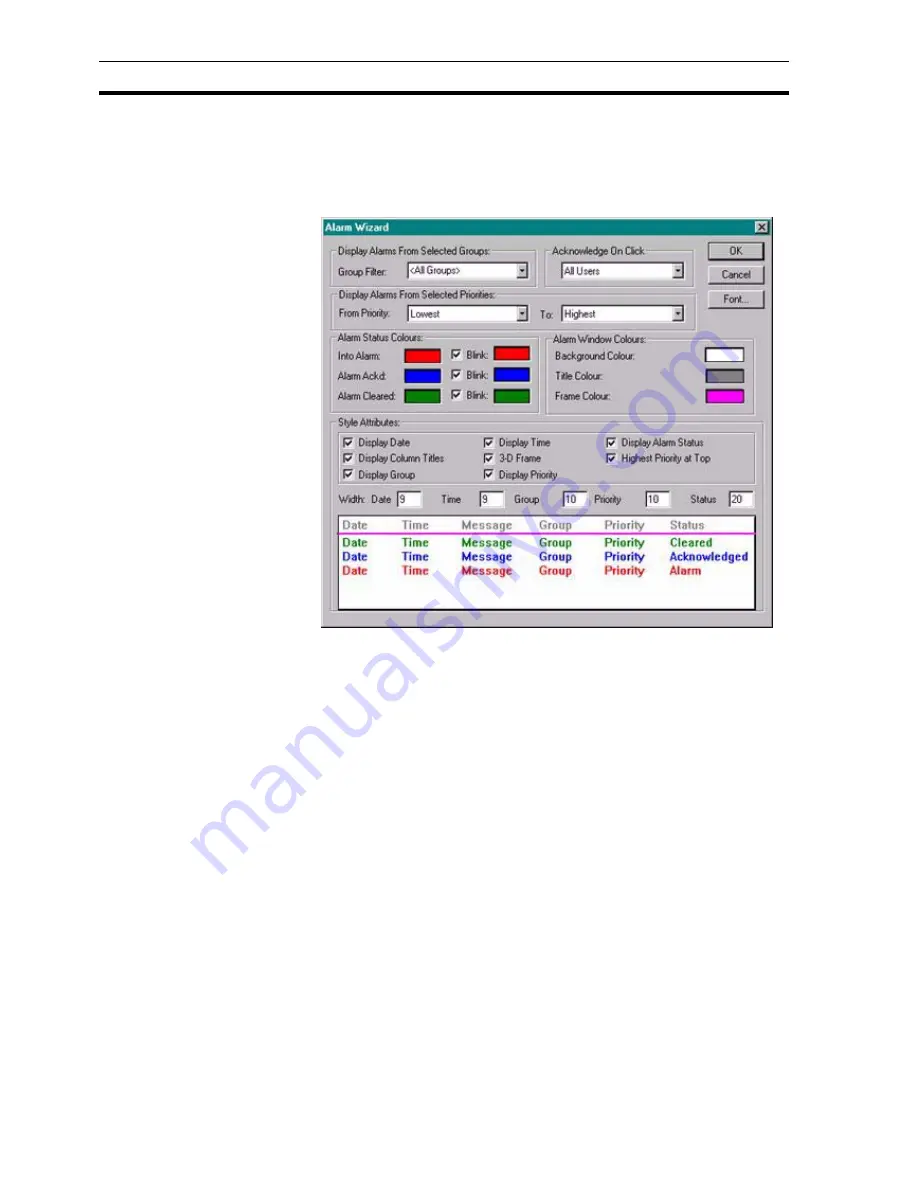
Creating and Editing Control Objects
SECTION 4 Objects
56
The Alarm object displays alarm messages in runtime. These messages may
be optionally filtered by an alarm group and can be formatted to include the
date, time and status of the alarm. If there are more alarms to view than the
space provided then you can scroll the alarm view.
To edit an Alarm object, double click on it. The Alarm Wizard dialog box opens:
Alarms are defined using the Alarm Editor; refer to chapter 8, Alarms for
information on using the Alarm Editor.
The Alarm Wizard allows entry of the alarm group filter, alarm status colour
codes and various style attributes. The Alarm Wizard presents a preview of
the alarm object, which immediately updates to show the user selections as
they are made.
1, 2, 3…
1. Select the name of the alarm group by which alarm messages are to be
filtered using the
Group
field to display the list of available groups. The
default selection is <All Groups>, which displays all alarm messages.
To display more than one group use the * wildcard character e.g. Group1*
will include all groups starting Group1.
2. From the
Acknowledge On Click
options select the level of security that
is required for acknowledgement. The default is
All Users
.
3. From the
Display Alarms
from
Selected Priorities
, options select the
range of alarms that are to be displayed. The default selections are from
the
Lowest
to the Highest.
Note that the range 'From' must be the same or lower than the range 'To'.
Use the check box 'Highest Priority at Top' to reverse the alarm order.
4. In
Alarm Status Colours
, the colour codes for each of the three alarm
states and blinking colours may be specified by clicking the appropriate
colour box and selecting a new colour from the resultant
Colour
dialog
box.
Summary of Contents for CX-Supervisor
Page 1: ...CX Supervisor Software Cat No W10E EN 01 User Manual Software Release 3 1...
Page 3: ...Copyright Notice 2...
Page 16: ...15...
Page 17: ...16...
Page 27: ...Tip of the Day SECTION 1 Graphics Editor 26...
Page 35: ...CX Supervisor Preferences SECTION 2 Pages 34...
Page 79: ...Responding to Events SECTION 5 ActiveX Objects 78...
Page 115: ...Printing the Graphics Library SECTION 7 Graphics Library 114...
Page 181: ...Data Logging SECTION 11 Data Logging 180...
Page 201: ...Examples SECTION 12 Databases 200...
Page 243: ...Performance Monitor SECTION 16 Application Analysis Performance Monitor 242...
Page 253: ...Using with Omron s CX Server OPC SECTION 17 Using CX Supervisor as an OPC Cli 252...
Page 259: ...Creating a CX Supervisor Client application SECTION 18 Connecting to a remote CX 258...
Page 263: ...Adding a Point Linked to a Parameter SECTION 19 Connecting to Omron Industrial 262...
Page 271: ...Data Logging SECTION 20 Best Practices 270...
Page 275: ...Configuring a Server PC running Windows NT or 2000 Appendix A Configuring a PC 274...
Page 277: ...Appendix B Frequently Asked Questions 276...
Page 296: ...Appendix B Frequently Asked Questions 295...
Page 297: ...Appendix B Frequently Asked Questions 296...
Page 298: ...Appendix B Frequently Asked Questions 297...
Page 299: ...Appendix B Frequently Asked Questions 298...
Page 333: ...Revision history 332...






























